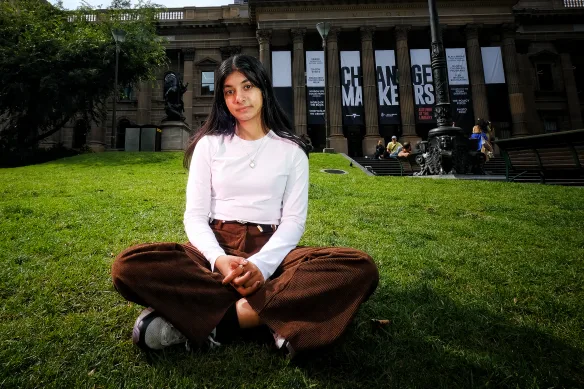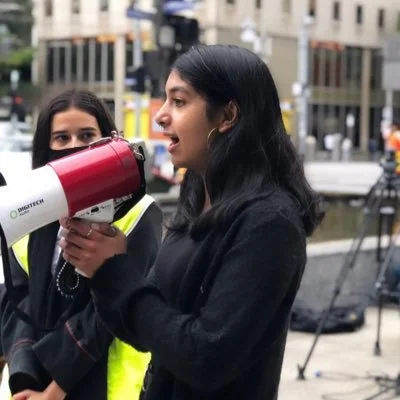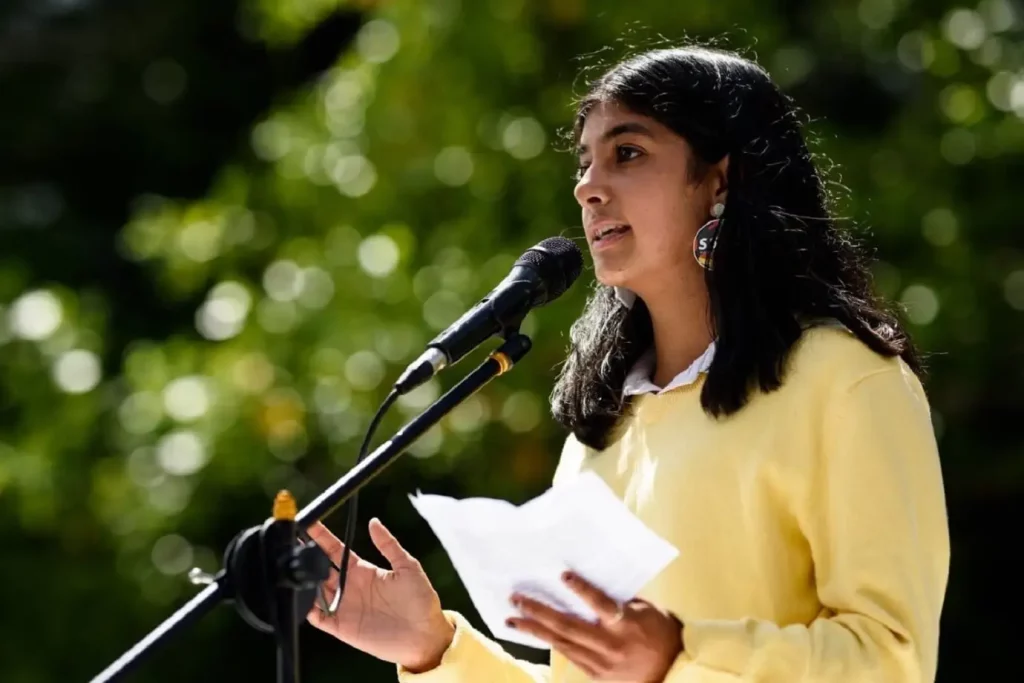(October 8, 2024) “At the age of 16, I sued the government of Australia. I was the lead litigant in the Sharma and Minister for the Environment Class Action, which took the then Environment Minister Susan Lee to court, arguing that she owed, and was breaching, a duty of care to young people to protect us from the impacts of climate change,” were Anjali Sharma’s opening words at TEDxYouth Sydney. Now at the age of 19, as she is balancing her second year of law studies at the Australian National University in Canberra, her fight for climate justice is far from over.
Far from the typical university experience, Anjali is at the forefront of a fight that could reshape how Australia tackles climate change. Her current mission? Rallying support for the Duty of Care and Intergenerational Climate Equity Bill 2023. This proposed amendment aims to make the government responsible for the long-term effects of its climate decisions, especially those involving fossil fuels like coal, oil, and gas. For Anjali, it’s not just about changing a law—it’s a personal mission to make sure future generations have a healthy planet to live on.

Anjali Sharma
From childhood in India to climate crusader in Australia
But before Anjali Sharma became the poised and passionate advocate addressing large crowds and challenging ministers, she was a baby cradled in her mother’s arms, moving from India to Australia at just ten months old. Born in India — a country she recognises as being on the frontline of climate change — her family emigrated to Melbourne, where she grew up as part of the thriving Indian diaspora – which is Australia’s second largest and fastest growing overseas group. From a young age, Anjali saw the clear differences between the landscapes of India and Australia. However, it was only later that she realised how climate change made the inequalities between these two places even worse.
Anjali’s path to activism wasn’t sparked by a single dramatic event, instead it was a slow realisation. It all began when Anjali was 12 and visited India and felt guilty seeing how vulnerable her family and neighbors in Lucknow were to the harsh realities of climate change, like severe storms, extreme heat, and crumbling buildings. She felt it was unfair that she was safe when other’s weren’t. The trip ignited a sense of responsibility in her. However, she soon realised that she wasn’t safe in Australia too after the 2019-20 bushfire left millions feeling anxious and unsettled. “There’s not a single person, especially in the east of the country, who wasn’t touched by that. We still talk about seeing the sky orange for days, the thick blanket of smoke which made it so hard to go outside and just breathe,” the Global Indian said in an interview. This led her to take more tangible action, setting the stage for her later lawsuit against the Australian government.


A personal journey: The awakening of a young activist
At 16, she took an extraordinary step when Anjali, along with seven other teens, sued the Federal Environment Minister in a landmark case that argued the government had a duty of care to protect young people from the risks of climate change. The Federal Court initially sided with Anjali and her group, stating that the Environment Minister had a duty to protect younger generations. However, this victory was short-lived because the government appealed the decision and overturned it in 2022. It was a hard blow for Sharma, but she didn’t let it stop her. “On one hand, we’re urged to be the change we want to see in the world, but when it comes to advocacy, we’re put in a box,” she said in TedTalk.
Instead of letting her frustration hold her back, Anjali Sharma focused on more advocacy work, this time aiming at changing laws. She has been working hard to promote the Duty of Care and Intergenerational Climate Equity Bill 2023, which seeks to fix gaps in climate policy. This bill ensures that future decisions about coal, oil, and gas exploration consider the health and well-being of young Australians and future generations. Despite facing many challenges in Parliament, Anjali remains determined to see the bill succeed.
Legislative change: Fighting for future generations
Anjali’s story is a strong example of climate activism, which means raising awareness and urging governments, companies, and communities to take quick and meaningful actions against climate change. At its core, climate activism aims to address the urgent need for changes in how societies interact with the environment, especially in how they take and use natural resources. It calls for big changes to ensure a sustainable future for everyone. “Young people need to know that you don’t need to be the perfect activist…firstly, be aware of the injustice of the issue, and then be willing to use the skills that you already have to make a difference,” she added.


For Anjali, climate activism is a way to deal with the overwhelming worry that many young people have about the future. This feeling, known as climate anxiety, is common among today’s youth. A 2020 study found that 78 percent of Australians aged 10 to 24 are very concerned about climate change, and this feeling is shared by teens worldwide. However, her activism offers hope for both herself and others. Her courage to take action against the odds proves that young people can truly make a difference.
For Sharma, climate activism has been a way to confront the overwhelming anxiety that many young people feel about the future. Known as climate anxiety, this chronic fear of environmental disaster is widespread among today’s youth. In fact, a 2020 study found that 78% of Australians aged 10-24 are deeply concerned about climate change, a sentiment echoed by teens around the world. Yet, Sharma’s activism is a source of hope, both for herself and for others. Her ability to stand up and take action against the odds shows that even young people can make a difference.
Anjali Sharma is part of a growing group of young Indian diaspora activists in Australia. The Indian community, connected to one of the most climate-affected areas in the world, offers a unique viewpoint in the global climate movement. Many of these young activists, including Sharma, feel a responsibility not only to their new home but also to their homeland, which is still suffering from the severe effects of climate change. This dual sense of belonging and duty is fueling a new wave of activism that crosses borders and cultures.
As Anjali Sharma continues her fight for climate justice, she carries the hopes of her peers and the legacy of her ancestors. She is a shining example of the power of youth activism, showing that age doesn’t stop anyone from making real, lasting change. Her journey, from her childhood in Lucknow to her groundbreaking legal battles in Australia, serves as an inspiring reminder that the future is not something to fear—it’s something worth fighting for.
As Anjali Sharma continues her fight for climate justice, she carries the hopes of her peers and the weight of her ancestors’ legacy. She embodies the power of youth activism, proving that age doesn’t limit one’s ability to create real, lasting change. Her journey, from her early years in Lucknow to her groundbreaking legal battles in Australia, serves as an inspiring reminder that the future is not something to fear—it is something to fight for.
- Follow Anjali Sharma on LinkedIn






